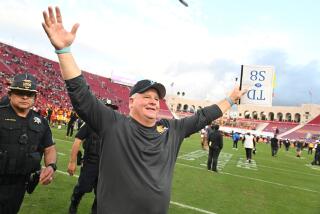Chip Kelly takes the fast track to tremendous heights at Oregon before hitting speed bumps in the NFL
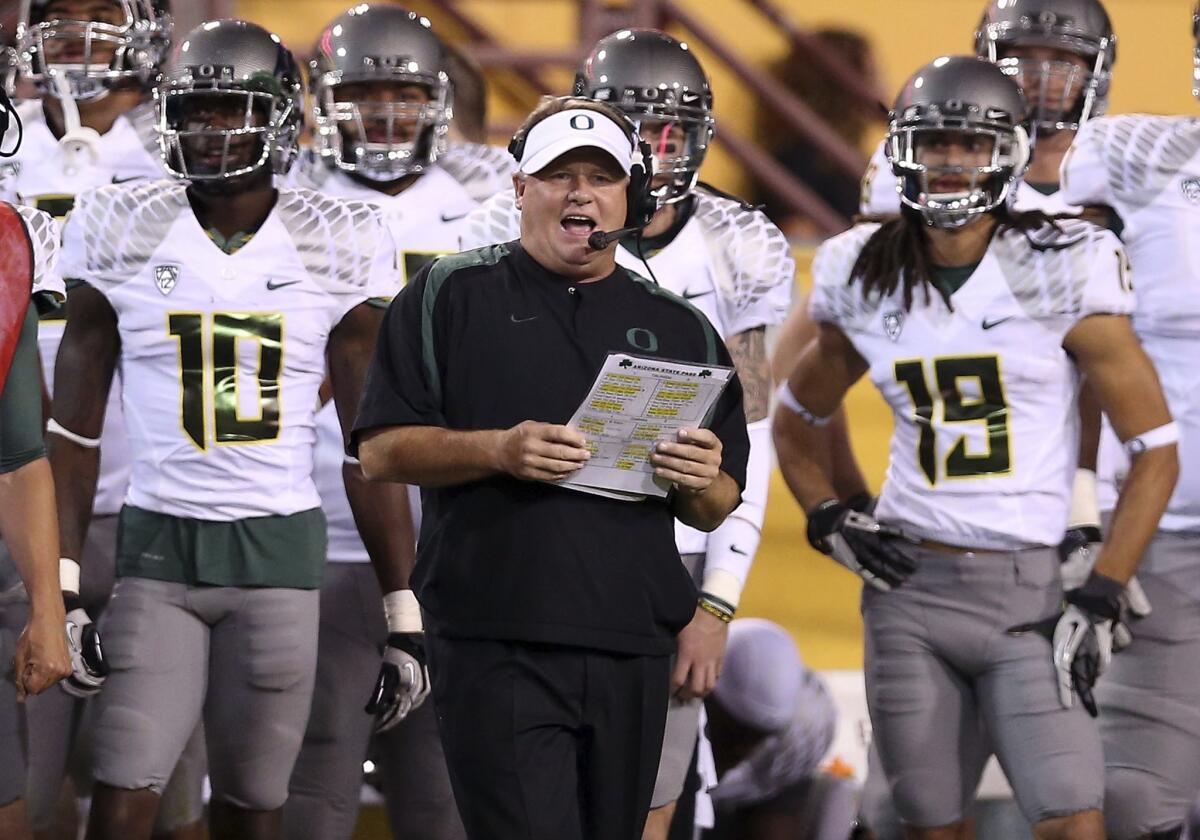
- Share via
Reporting from Eugene, Ore. — This is the second of a three-part series on Chip Kelly, UCLA’s new football coach.
None of the proposed mantras made any sense.
Win the national championship? Oregon’s football team was coming off a 7-6 season and had lost by 30 points to Brigham Young in the Las Vegas Bowl.
Win the Rose Bowl? The Ducks had not done that in nearly a century.
The team was certainly in need of some galvanizing in March 2007 as it held a brainstorming session at Camp Harlow, a wooded outpost north of campus. Coaches convened with players, equipment managers and trainers to seek solutions for the Ducks’ malaise.
Players yelled at players. Players yelled at coaches. Coaches yelled back. No one seemed to know what to do.
“We were terminal, the whole team,” said John Neal, the defensive backs coach.
As Neal sunk into his chair while listening to what seemed like increasingly absurd suggestions for a rallying cry, the new offensive coordinator sitting next to him made his pitch.
“Why don’t we just win the day?” Chip Kelly offered.
The other coaches perked up. It was perfect. Instead of focusing on some faraway concept, “Win the day” provided a constant reminder of the steps needed to get there. No one was going to reach a major bowl game without taking care of Monday.
The phrase carried a beautiful simplicity.
“I said, ‘It sounds great, let’s do it,’ ” Oregon coach Mike Bellotti said. “ ‘Let’s make that the motto.’ ”
The slogan wasn’t new to Kelly. He had used it at as an assistant at New Hampshire to help nudge players through the drudgery of spring practices, where an individual at each position “won” each day.
At Oregon, “Win the day” was the flashpoint for a giddy six-year stretch in which Kelly transformed the team into a player on the national stage, first as offensive coordinator and then as Bellotti’s successor.
If the Ducks stair-stepped their way to prominence under Bellotti, they took the express elevator to greatness under Kelly. They went 46-7 during Kelly’s four seasons, coming within a last-second Auburn field goal of possibly winning the national championship in the 2010 season.
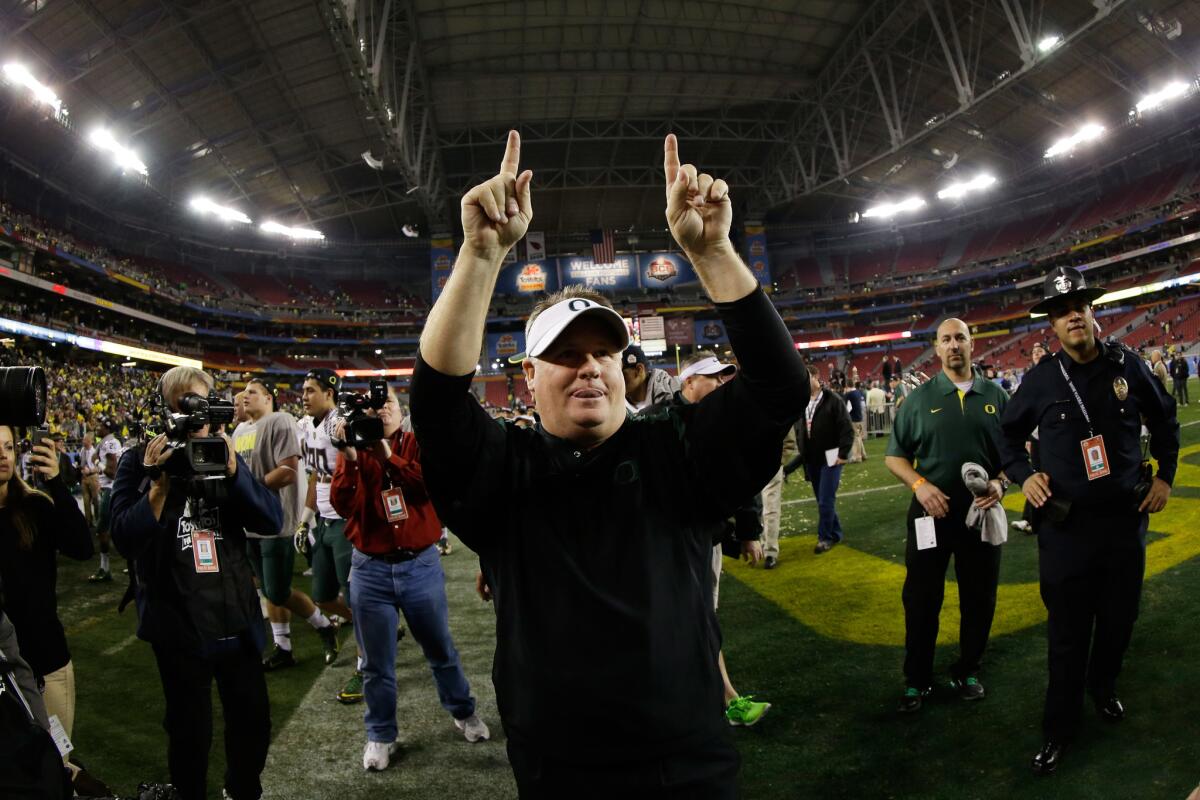
Kelly seemed to have all the answers until he reached the NFL, where a promising start was followed by an ingloriously abrupt end to stints with the Philadelphia Eagles and San Francisco 49ers. That led to a one-year coaching hiatus before Kelly replaced Jim Mora at UCLA in November.
No one at the school would be disappointed if he comes close to replicating what he did with his previous college teams.
::
Contrary to popular belief, Oregon was already running a spread offense and playing fast before Kelly’s arrival.
But the Ducks lacked the terminology to go no-huddle full time and jump to warp speed. Kelly changed that, simplifying the language and the way information was relayed.
Gary Crowton, the previous offensive coordinator, had given the signal to the quarterback, who would pass it on to the receivers. Kelly used hand signals that were seen by everyone simultaneously. Eventually, the Ducks used giant signs with such images as a battleship, pumpkin, eagle and ESPN football analyst Lee Corso. Decipherable only to Oregon’s players, the pictures indicated the formation, play and snap count.
“He started packaging things so that you could go fast, like a McDonald’s menu,” Crowton said.
Practices were no different. In previous years, the Ducks might run 20 plays in 20 minutes of team periods. The first time they switched to the no-huddle under Kelly, they got in 42 plays during that span.
Team managers were taught to sprint to place the ball before each snap. The play clock was reduced from 40 seconds to 30. Coaches had to resist the urge to correct mistakes in the midst of the madness that came to be known as the blur offense.
“We had to tell coaches, ‘You can’t talk between plays; get your players ready for the next play,’ ” said Bellotti, who also met with officials before games to instruct them on the only situations in which the Ducks wanted the balls changed so that the pace wouldn’t be slowed.
RELATED: Part 3 of the Chip Kelly series: UCLA’s Chip Kelly: a private man in a very public role »
Going fast did more than exhaust the other team; it forced opposing defensive coordinators to stay basic with their calls, allowing Kelly to dictate matchups and often pit his best players against an opponent’s worst.
“He found a weakness and had no problem to keep going after that weakness,” said Alex Miller, a quality control specialist and graduate assistant under Kelly. “I know sometimes as a play-caller, you think, ‘Aw, they’re going to get onto us at some point,’ but he just went after you until you stopped it.”
Oregon’s tempo increased incrementally as players adjusted, particularly the offensive linemen. The winning was instantaneous.
Oregon started the 2007 season 8-1, rising to No. 2 in the Bowl Championship Series poll, before an injury to quarterback Dennis Dixon precipitated a three-game losing streak. But the Ducks beat favored South Florida in the Sun Bowl, and Syracuse and Mississippi State were among a handful of schools that called Bellotti to inquire about Kelly for coaching vacancies.
Bellotti knew he wasn’t going to coach much longer, so he hatched an idea: Let’s make Kelly the Ducks’ coach-in-waiting. Having just lost the highly coveted Crowton to Louisiana State, school officials agreed to the plan.
After more than two decades as an assistant, Kelly was about to control a team for the first time.
::
Kelly served one more season as Bellotti’s offensive coordinator before Bellotti announced he was making an anticipated move from coach to athletic director, remaining Kelly’s boss.
Their first disagreement under the new arrangement came quickly. Oregon running back LeGarrette Blount punched a Boise State player after the Ducks’ 19-8 loss in Kelly’s September 2009 head coaching debut.
Bellotti advised Kelly to suspend Blount indefinitely and compile a list of conditions for his anticipated return. Kelly kicked Blount off the team.
“He said, ‘Mike, he punched somebody,’ ” Bellotti recalled Kelly telling him. “I said, ‘I know. I saw it, believe me, I was there. I watched the whole thing. I died 1,000 deaths while it happened. But you’re going to want to try to save him.’ He said, ‘No, I can’t.’ ”
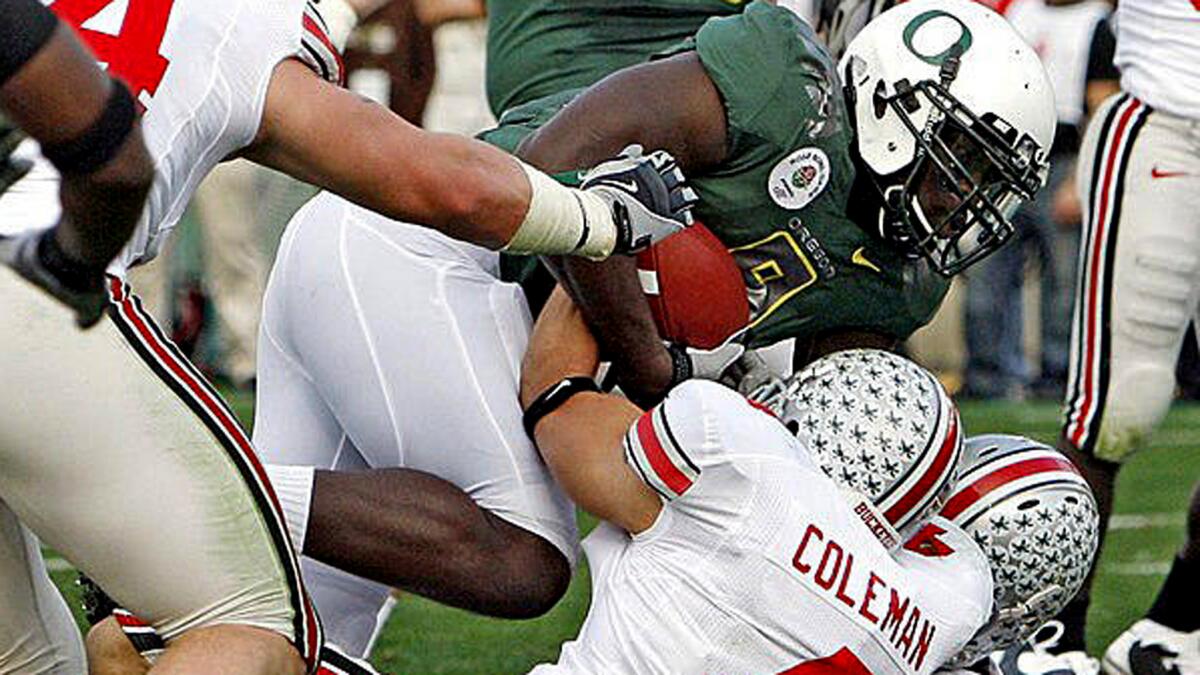
Kelly reinstated Blount later in the season, drawing criticism for being indecisive, but the Ducks’ success remained constant after the disappointing opener. They won 10 of their next 11 games to capture the Pac-10 Conference title and an invitation to the Rose Bowl, the school’s first since 1994.
That was followed by a 12-0 regular season in 2010 and a trip to the BCS national championship game. Oregon pulled into a tie late with a touchdown and a two-point conversion, but Auburn drove to the one-yard line and kicked the winning field goal as time expired.
By the end of Kelly’s third season, when the Ducks finished 12-2 with a triumph over Wisconsin in the Rose Bowl, NFL teams had become intrigued by the coach who paired a madcap offense with an aggressive, attacking defense. Kelly strongly considered an offer from the Tampa Bay Buccaneers before deciding to return to Oregon.
The Ducks were in the midst of a controversy that might have pushed other coaches out the door. The NCAA was investigating the school’s $25,000 payment to a recruiting service with ties to high school prospects being pursued by the Ducks.
Oregon was eventually placed on three years’ probation and Kelly was issued an 18-month show-cause order, forcing any school wanting to hire him during that time to justify its choice to the NCAA.
But Kelly was already gone by the time that punishment was announced, parlaying a 12-1 season in 2012 into a job as Andy Reid’s successor with the Eagles (though he did return to answer questions from the NCAA Committee on Infractions without being compelled to do so).
Only four years removed from being an offensive coordinator and six years removed from the minor leagues of college football, Kelly was headed for the NFL. The coach and his Oregon players cried together when he informed them he was leaving, overcome by the emotional tug of their unlikely mutual rise.
“There was kind of an aura that Chip Kelly invented football at the University of Oregon, which obviously wasn’t the case,” said Dave Williford, the Ducks’ longtime sports information director. “But from some people’s standpoint, he took Oregon to heights that were never imaginable.”
::
Curiosity about Kelly intensified on the eve of his NFL debut.
Would his schemes work at football’s highest level? Might professional players be less eager than 19- and 20-year-olds to buy into the strict diet and conditioning required to run his frenzied pace? How would Kelly fare against the likes of more established counterparts Bill Belichick and Pete Carroll?
Any doubts about Kelly’s intentions with his cutting-edge sports science program were erased when players arrived at their lockers each day to find plastic specimen cups, the contents of which would reveal their hydration levels. Their heart rates and sleep habits were also closely monitored.
“Running the amount of plays we were,” tight end Brent Celek said, “if you didn’t take care of your body you weren’t going to make it to the next day.”
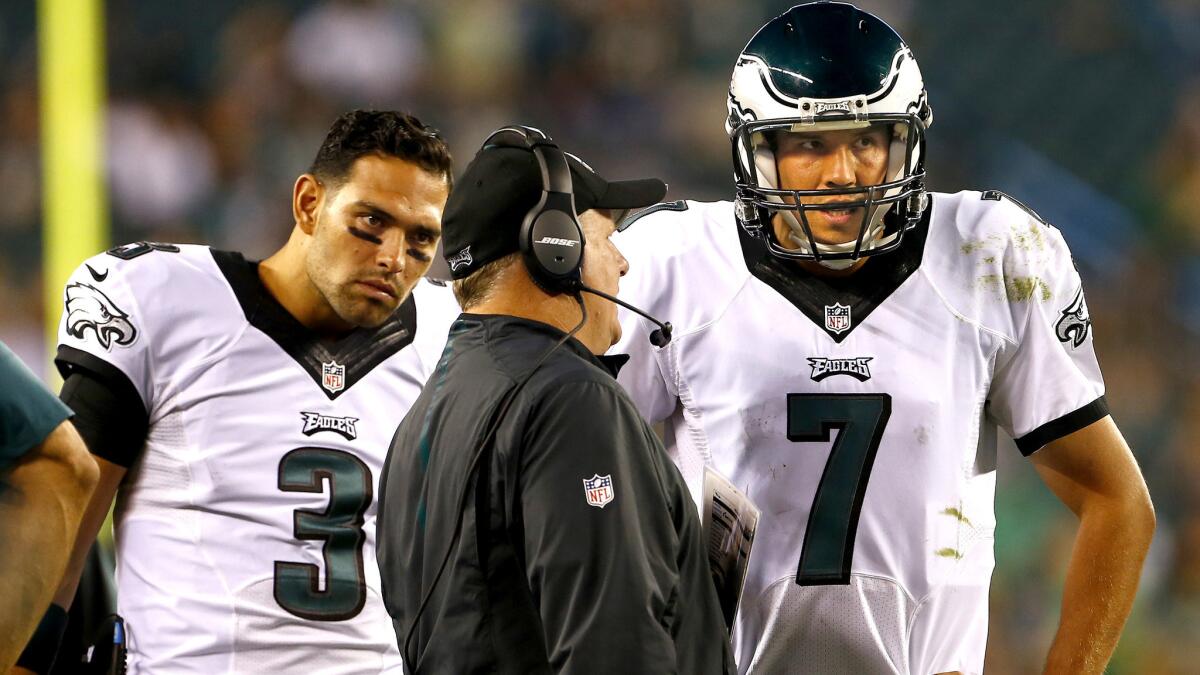
The football world wondered whether a new sort of coaching savant might have emerged when Philadelphia won the NFC East in Kelly’s first season, going 10-6 before losing to the New Orleans Saints in the first round of the playoffs. The Eagles got off to a 9-3 start the next season and were widely hailed as Super Bowl contenders.
They weren’t. Quarterback Nick Foles’ breakthrough 2013 season gave way to an injury-shortened and ineffective 2014. The offensive line was beset by a slew of injuries. The secondary was continually suspect.
Kelly’s answer was to assume control of player personnel after a power struggle with general manager Howie Roseman, who took a new role with no say over the roster. But Kelly had other worries besides the team’s 1-3 slide to close 2014, which caused the Eagles to miss the playoffs.
A few players essentially called Kelly racist after he cut DeSean Jackson and traded LeSean McCoy. Others saw it as a fake controversy.
“I mean, dude, I don’t think Chip was racist at all,” said Celek, who is white. “I don’t even like to get into that because I see everybody as equal myself.”
Kelly’s undoing was sealed when the Eagles never crept above .500 with a remade roster in 2015, leading to his dismissal with one game left in the season and the Eagles at 6-9. Roseman had pulled an end-around, regaining full control with the backing of team owner Jeffrey Lurie.
Mark Saltveit, who wrote two books about Kelly and has chronicled his every move since his days at Oregon, said a reporter turned off the lights in a symbolic gesture during Kelly’s final news conference.
“There’s an omen,” Kelly said in the darkness.
A one-and-done season followed with the San Francisco 49ers, who slogged their way to a 2-14 record, though there were no meaningful takeaways besides a weak roster in a tough division. Kelly abandoned the uptempo offense, explaining that going slower made more sense for his team, but it made no difference amid loss after loss.
Kelly did enhance his image as more of a player’s coach by fully supporting Colin Kaepernick during the controversy that erupted when the 49ers quarterback knelt during the national anthem to protest racial injustice. But Kelly’s NFL failures prompted criticism that his once-innovative schemes had grown stale and predictable.
A year after his departure from the 49ers, Kelly traded in an analyst gig at ESPN for a shot at glory at UCLA. Some people believe he hopes to use the college game as a stopover on his way back to the NFL, a la Carroll with USC.
Long-suffering Bruins fans might not mind if he can first win the day once more.
“His success at Oregon is unparalleled and that may be a blessing, it may be a curse,” Bellotti said. “It’s going to be hard to replicate that success.”
More from the series:
Chip Kelly, a personable but very private man.
The making of a beautiful mind: Chip Kelly’s early coaching days
More to Read
Go beyond the scoreboard
Get the latest on L.A.'s teams in the daily Sports Report newsletter.
You may occasionally receive promotional content from the Los Angeles Times.

